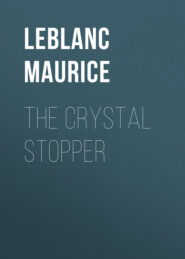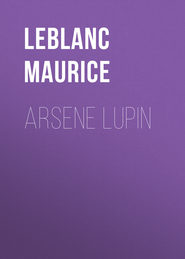По всем вопросам обращайтесь на: info@litportal.ru
(©) 2003-2025.
✖
The Extraordinary Adventures of Arsene Lupin, Gentleman-Burglar
Настройки чтения
Размер шрифта
Высота строк
Поля
“That is what we are going to find out.”
I led the men to a large room. The three of us could hide comfortably behind the velvet chimney-mantle, and observe all that should happen in the room. We seated ourselves there, with Madame Andermatt in the centre.
The clock struck nine. A few minutes later, the garden gate creaked upon its hinges. I confess that I was greatly agitated. I was about to learn the key to the mystery. The startling events of the last few weeks were about to be explained, and, under my eyes, the last battle was going to be fought. Daspry seized the hand of Madame Andermatt, and said to her:
“Not a word, not a movement! Whatever you may see or hear, keep quiet!”
Some one entered. It was Alfred Varin. I recognized him at once, owing to the close resemblance he bore to his brother Etienne. There was the same slouching gait; the same cadaverous face covered with a black beard.
He entered with the nervous air of a man who is accustomed to fear the presence of traps and ambushes; who scents and avoids them. He glanced about the room, and I had the impression that the chimney, masked with a velvet portiere, did not please him. He took three steps in our direction, when something caused him to turn and walk toward the old mosaic king, with the flowing beard and flamboyant sword, which he examined minutely, mounting on a chair and following with his fingers the outlines of the shoulders and head and feeling certain parts of the face. Suddenly, he leaped from the chair and walked away from it. He had heard the sound of approaching footsteps. Mon. Andermatt appeared at the door.
“You! You!” exclaimed the banker. “Was it you who brought me here?”
“I? By no means,” protested Varin, in a rough, jerky voice that reminded me of his brother, “on the contrary, it was your letter that brought me here.”
“My letter?”
“A letter signed by you, in which you offered–”
“I never wrote to you,” declared Mon. Andermatt.
“You did not write to me!”
Instinctively, Varin was put on his guard, not against the banker, but against the unknown enemy who had drawn him into this trap. A second time, he looked in our direction, then walked toward the door. But Mon. Andermatt barred his passage.
“Well, where are you going, Varin?”
“There is something about this affair I don’t like. I am going home. Good evening.”
“One moment!”
“No need of that, Mon. Andermatt. I have nothing to say to you.”
“But I have something to say to you, and this is a good time to say it.”
“Let me pass.”
“No, you will not pass.”
Varin recoiled before the resolute attitude of the banker, as he muttered:
“Well, then, be quick about it.”
One thing astonished me; and I have no doubt my two companions experienced a similar feeling. Why was Salvator not there? Was he not a necessary party at this conference? Or was he satisfied to let these two adversaries fight it out between themselves? At all events, his absence was a great disappointment, although it did not detract from the dramatic strength of the situation.
After a moment, Mon. Andermatt approached Varin and, face to face, eye to eye, said:
“Now, after all these years and when you have nothing more to fear, you can answer me candidly: What have you done with Louis Lacombe?”
“What a question! As if I knew anything about him!”
“You do know! You and your brother were his constant companions, almost lived with him in this very house. You knew all about his plans and his work. And the last night I ever saw Louis Lacombe, when I parted with him at my door, I saw two men slinking away in the shadows of the trees. That, I am ready to swear to.”
“Well, what has that to do with me?”
“The two men were you and your brother.”
“Prove it.”
“The best proof is that, two days later, you yourself showed me the papers and the plans that belonged to Lacombe and offered to sell them. How did these papers come into your possession?”
“I have already told you, Mon. Andermatt, that we found them on Louis Lacombe’s table, the morning after his disappearance.”
“That is a lie!”
“Prove it.”
“The law will prove it.”
“Why did you not appeal to the law?”
“Why? Ah! Why–,” stammered the banker, with a slight display of emotion.
“You know very well, Mon. Andermatt, if you had the least certainty of our guilt, our little threat would not have stopped you.”
“What threat? Those letters? Do you suppose I ever gave those letters a moment’s thought?”
“If you did not care for the letters, why did you offer me thousands of francs for their return? And why did you have my brother and me tracked like wild beasts?”
“To recover the plans.”
“Nonsense! You wanted the letters. You knew that as soon as you had the letters in your possession, you could denounce us. Oh! no, I couldn’t part with them!”
He laughed heartily, but stopped suddenly, and said:
“But, enough of this! We are merely going over old ground. We make no headway. We had better let things stand as they are.”
“We will not let them stand as they are,” said the banker, “and since you have referred to the letters, let me tell you that you will not leave this house until you deliver up those letters.”
“I shall go when I please.”
“You will not.”
“Be careful, Mon. Andermatt. I warn you–”
“I say, you shall not go.”
“We will see about that,” cried Varin, in such a rage that Madame Andermatt could not suppress a cry of fear. Varin must have heard it, for he now tried to force his way out. Mon. Andermatt pushed him back. Then I saw him put his hand into his coat pocket.











